七年级英语下册期末总复习资料【仁爱版】
最新仁爱版七年级英语下册期末知识点总复习
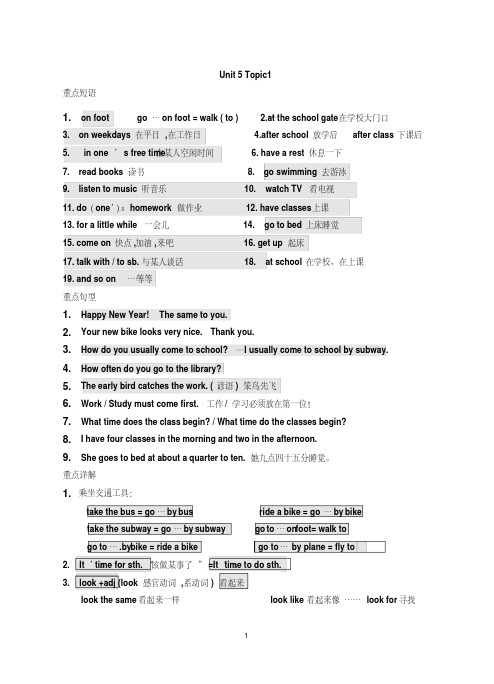
Unit 5 Topic1重点短语1.on foot go …on foot = walk ( to )… 2.at the school gate在学校大门口3. on weekdays 在平日 ,在工作日4.after school 放学后after class 下课后在某人空闲时间 6. have a rest 休息一下5. in one’s free time7. read books 读书8. go swimming 去游泳9. listen to music 听音乐10. watch TV 看电视11. do(one’s)homework 做作业12. have classes 上课13. for a little while 一会儿14. go to bed 上床睡觉15. come on 快点,加油,来吧16. get up 起床17. talk with / to sb.与某人谈话18. at school 在学校、在上课19. and so on ……等等重点句型1.Happy New Year! The same to you.2.Your new bike looks very nice. Thank you.3.How do you usually come to school? —I usually come to school by subway.4.How often do you go to the library?5.The early bird catches the work. (谚语) 笨鸟先飞6.Work / Study must come first. 工作/ 学习必须放在第一位!7.What time does the class begin? / What time do the classes begin?8.I have four classes in the morning and two in the afternoon.9.She goes to bed at about a quarter to ten. 她九点四十五分睡觉。
2020春仁爱版七年级英语下册 期末总复习知识要点集锦

2020年仁爱版七年级下期末复习重点Unit 5 Topic1重点句型1.Happy New Year! 回答:The same to you.MerryChristmas!回答:The same to you.2.Your new bike looks very nice. ---Thank you.3.How do you usually come to school? —I usually come toschool by subway.4.问频率:How often do you go to the library? 多久一次?”5.—Once/Twice/Three times a week/Very often/Everyday/Seldom6.The early bird catches the worm. (谚语) 笨鸟先飞7.At a quarter past five,she takes the subway home.8.Classes begin at eight. =Class begins at eight.9.What time does the class begin? / What time do the classesbegin?10.We have no more time. 我们没有更多的时间了。
11.I have four classes in the morning and two in the afternoon.我早上上四节课,下午上两节。
12.She goes to bed at about a quarter to ten. 她九点四十五分睡觉。
1.表示使用某种交通方式,中间不加限定词,a, the, my 等限定词,就不能用by,而是take.go to...bytake a bus/car/train take the subway )我总是坐公交来上学。
仁爱版七年级下册英语Unit 7 期末复习提纲
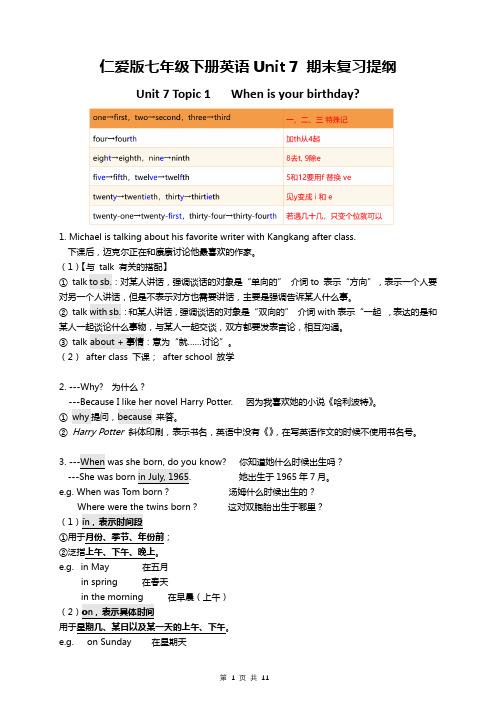
仁爱版七年级下册英语Unit 7 期末复习提纲Unit 7 Topic 1 When is your birthday?1. Michael is talking about his favorite writer with Kangkang after class.下课后,迈克尔正在和康康讨论他最喜欢的作家。
(1)【与talk 有关的搭配】①talk to sb.:对某人讲话,强调谈话的对象是“单向的” 介词to 表示“方向”,表示一个人要对另一个人讲话,但是不表示对方也需要讲话,主要是强调告诉某人什么事。
②talk with sb.:和某人讲话,强调谈话的对象是“双向的” 介词with表示“一起,表达的是和某人一起谈论什么事物,与某人一起交谈,双方都要发表言论,相互沟通。
③talk about + 事情:意为“就……讨论”。
(2)after class 下课;after school 放学2. ---Why? 为什么?---Because I like her novel Harry Potter. 因为我喜欢她的小说《哈利波特》。
①why提问,because 来答。
②Harry Potter斜体印刷,表示书名,英语中没有《》,在写英语作文的时候不使用书名号。
3. ---When was she born, do you know? 你知道她什么时候出生吗?---She was born in July, 1965. 她出生于1965年7月。
e.g. When was Tom born?汤姆什么时候出生的??这对双胞胎出生于哪里?(1)in,表示时间段①用于月份、季节、年份前;②泛指上午、下午、晚上。
e.g. in May 在五月in spring 在春天在早晨(上午)(2)on,表示具体时间用于星期几、某日以及某一天的上午、下午。
on the morning of October 13th 在10月13日的上午4. ---When is your birthday, Kangkang? 康康,你的生日是什么时候?---May 13th. 5月13日。
新版仁爱英语七年级下册总复习资料

Unit 5 Our School LifeTopic 1 I usually come to school bu subway。
重点短语1. on foot go …on foot = walk ( to )…2.by plane/ship/bus/subway3. on weekdays 在平日5. after school 放学后6. in their free time 在空闲时间7. have a rest 休息一下 8. do(one’s) homework 做作业9. once a week 一周一次10. have classes 上课11. at the school gate 在校门口 12. come on 快点、加油13. Talkwith to sb.与某人谈话 14.for a short time 一会儿15.know about 了解语法:表时间频率的副词:never 从来不 seldom 极少 sometimes 有时 often 经常usually 常常 always 总是四. 重要句型1. Happy New Year! The same to you.2. Your new bike looks very nice. Thank you.3. How do you usually come to school ? By bus / car / bike. On foot.4. It’s time for class. = It’s time to have class. 该是上课的时候了。
5. The early bird catches the worm. 笨鸟先飞。
/ 捷足先登。
6. We have no more time. 我们没有更多的时间了。
7. She goes to bed at about a quarter to ten.她九点四十五分睡觉。
仁爱英语七年级下期末总复习易错题汇总(经典)
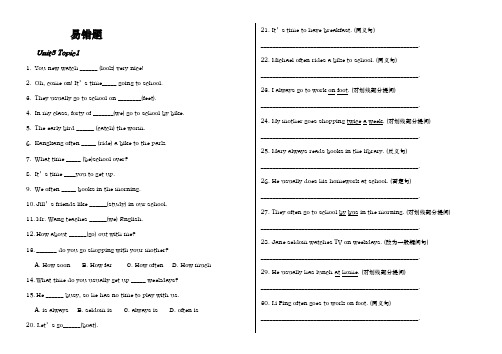
易错题Unit5 Topic11.You new watch ______ (look) very nice!2.Oh, come on! It’s time_____ going to school.3.They usually go to school on ________(feet).4.In my class, forty of _______(we) go to school by bike.5.The early bird ______ (catch) the worm.6.Kangkang often _____ (ride) a bike to the park.7.What time _____ (be)school over?8.It’s time ____you to get up.9.We often _____ books in the morning.10.Jill’s friends like ______(study) in our school.11.Mr. Wang teaches ______(we) English.12.How about ______(go) out with me?13._______ do you go shopping with your mother?A. How soonB. How farC. How oftenD. How much14.What time do you usually get up _____ weekdays?15.He ______ busy, so he has no time to play with us.A. is alwaysB. seldom isC. always isD. often is20. Let’s go______(boat). 21. It’s time to have breakfast. (同义句)______________________________________________________.22. Michael often rides a bike to school. (同义句)______________________________________________________.23. I always go to work on foot. (对划线部分提问)______________________________________________________.24. My mother goes shopping twice a week. (对划线部分提问)______________________________________________________.25. Mary always reads books in the library. (反义句)______________________________________________________.26. He usually does his homework at school. (否定句)______________________________________________________.27. They often go to school by bus in the morning. (对划线部分提问) ______________________________________________________.28. Jane seldom watches TV on weekdays. (改为一般疑问句)______________________________________________________.29. He usually has lunch at home. (对划线部分提问)______________________________________________________.30. Li Ping often goes to work on foot. (同义句)______________________________________________________.31. 几乎没有学生乘地铁去学校。
仁爱版七年级下册英语复习知识点
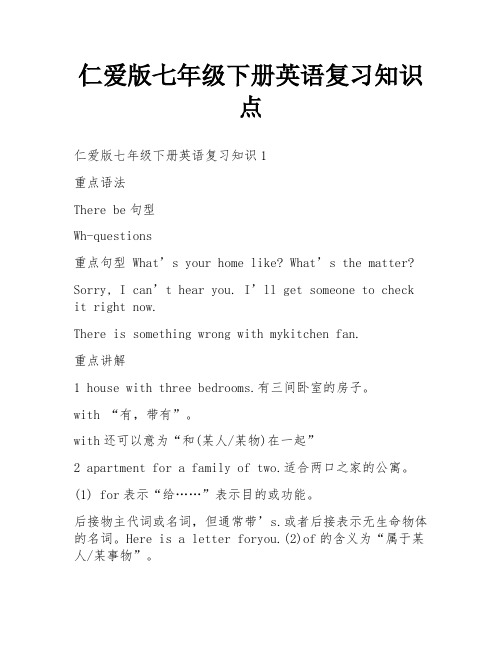
仁爱版七年级下册英语复习知识点仁爱版七年级下册英语复习知识1重点语法There be句型Wh-questions重点句型What’s your home like? What’s the matter?Sorry, I can’t hear you. I’ll get someone to check it right now.There is something wrong with mykitchen fan.重点讲解1 house with three bedrooms.有三间卧室的房子。
with “有,带有”。
with还可以意为“和(某人/某物)在一起”2 apartment for a family of two.适合两口之家的公寓。
(1) for表示“给……”表示目的或功能。
后接物主代词或名词,但通常带’s.或者后接表示无生命物体的名词。
Here is a letter foryou.(2)of的含义为“属于某人/某事物”。
She is a friend of Lily’s. = She is Lily’s friend.3 What’s the matter?怎么了?该句常用来询问某或某物出了什么什么问题或毛病;询问具体某人或某物出了什么问题时,还可以表达为:What’s the matter with sb./sth.某人或某物出了什么毛病。
What’s the matter? = What’swrong?4 Ihear you playing the piano.我听见你在弹钢琴。
hear…doing sth.“听见……在做某事”,强调正在进行的动作。
hear…dosth.“听见……做了某事”,强调全过程。
hearabout sth.听到关于某事物的消息 hear from sb.接到某人的来信、电话等hear of sb./sth.听到或知道某人或某事物的情况5 a lot of = lots of许多后接可数名词,相当于many;后接不可数名词,相当于much,用于肯定句中;但是注意:如果是否定句,则常用many或much.6 be far from… 离……远(抽象距离)be…away from…离……远(具体距离)My school is not far from thebookstore. The sea is 2 miles away fromthe hotel.7 There is something wrong with sb./sth.某人或某物出问题/有毛病了。
仁爱英语七年级下期末复习一

七年级英语期末复习一一、频度:表示频度可以用频度副词和短语来表达如:always>usually>often>sometimes>seldom> neveronce a week, twice a month, three times a year, everyday等等I always (总是100%)go to school by bike.I usually (经常80%)go to school by car.I often (通常60%)go to school by bus.I sometimes (有时40%)go to school by subway.I seldom (很少10%)go to school on foot.I never (从不0%)go to school by train.He goes to school everyday.She goes to Shanghai twice a month.对频度的提问,应该用how oftenHe always goes to the park on foot.——how often does he go to the park on foot?She goes to see her mother every week.——how often does she go to see her mother?They go to Shanghai twice a month.——how often do they go to Shanghai?巩固练习:()1.—How often does your sister surf the Internet? —About( .)A. three timeB. three timesC. three time every dayD. three times a day()2. (2009·沈阳中考) -Does Alice often work until 2 a.m.? -No, she ________ does.A. nearlyB. certainlyC. seldomD. always() 3. (2009·江西中考) –I didn’t know you take a bus to school.—Oh, I ______ take a bus, but it is snowing today.A. hardlyB. neverC. sometimesD. usually()4. (2009·阜康中考) -Were you often late for school last term, Tom?-No, _______. I got to school early every day.A. AlwaysB. UsuallyC. SometimesD. Never()5. (2009·山西中考) –How often do you go to a concert?-_______ ever. I’m not interested in that at all.A. UsuallyB. HardlyC. Almost( )6. (2009·常州中考) -John sings so well. Has he ever been trained?-No. He learns all by himself. He ________ goes to any training class.A. usuallyB. oftenC. neverD. even( )7. (2009·漳州中考) –Miss Gao is very popular with her students.-Yes. Her classes are ______ lively and interesting.A. seldomB. neverC. sometimesD. always( )8. (2008·攀枝花中考) We are going to have a party ________ next week.A. sometimeB. some timeC. sometimesD. some times( )9. (2008·芜湖中考) Sandy is so careful that she ________ makes mistakes in her homework.A. usuallyB. seldomC. oftenD. always二、交通方式的表达:By+交通工具或动词短语构成by bike, by bus, by car , by plane/ air, by train , by subway,by land, by sea, by water, on foot,ride a bike, take a bus, take a plane, take a train, take the subway, walk to.交通工具名称:bike, bus, plane, air, train, subway等问交通方式则应该用how, 如:例:How does he go to school?How do you go to the park?How does she go to work?巩固练习:I:用by,in,on,take填空。
仁爱版七年级下册期末总复习
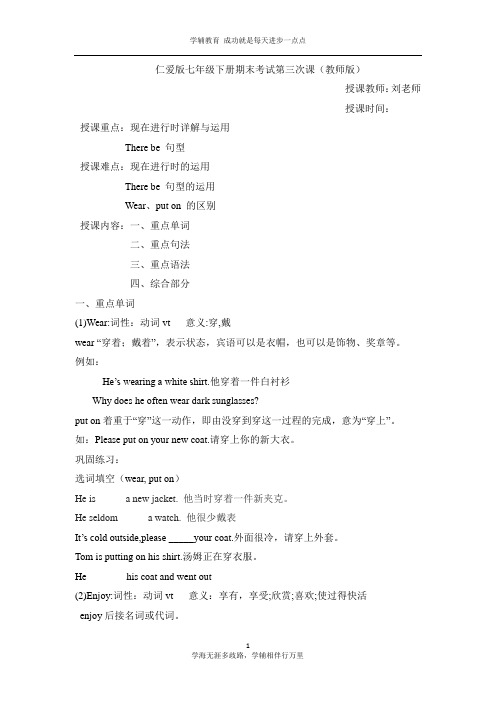
仁爱版七年级下册期末考试第三次课(教师版)授课教师:刘老师授课时间:授课重点:现在进行时详解与运用There be 句型授课难点:现在进行时的运用There be 句型的运用Wear、put on 的区别授课内容:一、重点单词二、重点句法三、重点语法四、综合部分一、重点单词(1)Wear:词性:动词vt 意义:穿,戴wear “穿着;戴着”,表示状态,宾语可以是衣帽,也可以是饰物、奖章等。
例如:He’s wearing a white shirt.他穿着一件白衬衫Why does he often wear dark sunglasses?put on着重于“穿”这一动作,即由没穿到穿这一过程的完成,意为“穿上”。
如:Please put on your new coat.请穿上你的新大衣。
巩固练习:选词填空(wear, put on)He is _____ a new jacket. 他当时穿着一件新夹克。
He seldom _____ a watch. 他很少戴表It’s cold outside,please _____your coat.外面很冷,请穿上外套。
Tom is putting on his shirt.汤姆正在穿衣服。
He _______ his coat and went out(2)Enjoy:词性:动词vt 意义:享有,享受;欣赏;喜欢;使过得快活enjoy后接名词或代词。
【例如】:They are enjoying their dinner.他们在津津有味地吃饭。
Do you enjoy the film?你喜欢这部电影吗?enjoy后面可接动词的-ing形式。
【例如】:I enjoy listening to light music.Do you enjoy reading?你喜欢读书吗?判断正误:He enjoys play football.He enjoys to play football.He enjoys playing footballenjoy后面可接反身代词(oneself),构成固定搭配enjoy oneself,意为“过得愉快、玩得高兴” ,相当于have a good time。
仁爱版英语七年级下册知识点复习归纳
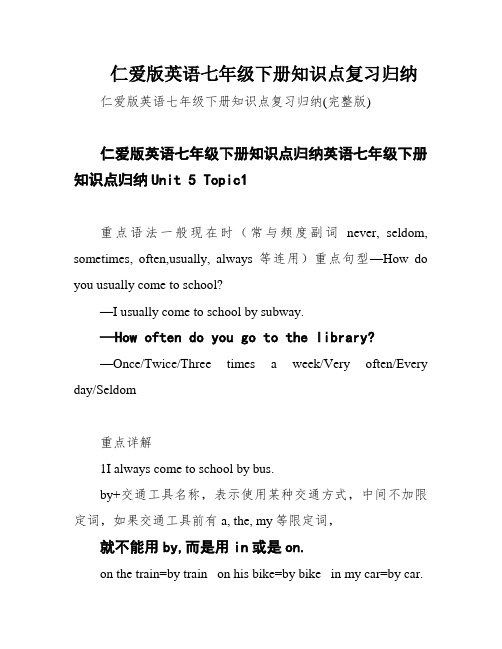
仁爱版英语七年级下册知识点复习归纳仁爱版英语七年级下册知识点复习归纳(完整版)仁爱版英语七年级下册知识点归纳英语七年级下册知识点归纳Unit 5 Topic1重点语法一般现在时(常与频度副词never, seldom, sometimes, often,usually, always等连用)重点句型—How do you usually come to school?—I usually come to school by subway.—How often do you go to the library?—Once/Twice/Three times a week/Very often/Every day/Seldom重点详解1I always come to school by bus.by+交通工具名称,表示使用某种交通方式,中间不加限定词,如果交通工具前有a, the, my等限定词,就不能用by,而是用in或是on.on the train=by train on his bike=by bike in my car=by car.巧辩异同on foot与w alk on foot“走路”,是介词短语,不能作谓语,只作方式状语,位于句末。
walk“走路”,是动词,可以作谓语。
goto…onfoot= walk toI often go to school on foot. =I often walk to school.仁爱版英语七年级下册知识点复习归纳(完整版)同样,go to….bybike = ride a bike togoto….by car = drive a car togo to…by plane = fly togoto…b y bus = take a bus to2 Come on!It’stime for class. come on“快点,加油,来吧”。
It’stime for sth.“该做某事了”,与It’stime to do sth.意思一样。
(仁爱版)七年级下册英语总复习Unit 6 Topic-2知识点、练习和参考答案
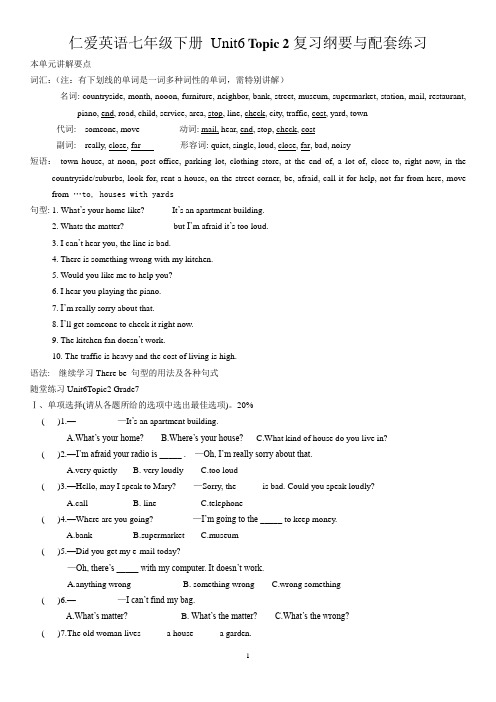
仁爱英语七年级下册Unit6 Topic 2复习纲要与配套练习本单元讲解要点词汇:(注:有下划线的单词是一词多种词性的单词,需特别讲解)名词: countryside, month, nooon, furniture, neighbor, bank, street, museum, supermarket, station, mail, restaurant, piano, end, road, child, service, area, stop, line, check, city, traffic, cost, yard, town代词: someone, move 动词: mail, hear, end, stop, check, cost副词: really, close, far 形容词: quiet, single, loud, close, far, bad, noisy短语:town house, at noon, post office, parking lot, clothing store, at the end of, a lot of, close to, right now, in the countryside/suburbs, look for, rent a house, on the street corner, be, afraid, call it for help, not far from here, move from…to, houses with yards句型: 1. What’s your home like? --It’s an apartment building.2. Whats the matter? --but I’m afraid it’s too loud.3. I can’t hear you, the line is bad.4. There is something wrong with my kitchen.5. Would you like me to help you?6. I hear you playing the piano.7. I’m really sorry about that.8. I’ll get someone to check it right now.9. The kitchen fan doesn’t work.10. The traffic is heavy and the cost of living is high.语法: 继续学习There be 句型的用法及各种句式随堂练习Unit6Topic2 Grade7Ⅰ、单项选择(请从各题所给的选项中选出最佳选项)。
仁爱英语七年级下册期末复习重点归纳

仁爱英语七年级下册期末复习重点归纳本页仅作为文档页封面,使用时可以删除This document is for reference only-rar21year.March仁爱英语七年级下册期末复习重点归纳一、名词复数.photo- photos child-children foot-feet tooth- teeth knife-knives baby-babies 家庭family-families 马铃薯 potato----potatoes 树叶leaf---leaves德国人German s二、一般现在时中单数第三人称动词构造1. 直接加s (元音字母+y 直接加)likes, wants, plays, stays, enjoys, buys2. s, x, sh, ch ,o结尾加 es-------teaches, watches, washes , passes, goes, does3. 辅音字母+y ,去y改i加es study---studies, fly---flies, carry---carries,三、现在进行时be + V-ing (现在分词)现分词词特殊构造:1. 去e 加 ing。
如: dance---dancing, write---writing, live---living, make---making, ride---riding, drive---driving2. 双写加ing。
如: put—putting, get---getting, swim---swimming, run---running, sit---sitting, shop---shopping, plan---planning, begin- beginning四、一般过去时1. 肯定形式:动词用其过去式,只能填一个词(绝对不可用be跟原形,也不可用be跟过去式)如:was play, were perform, was go, were bought, was made ×这些都错如果没有表示动作的实意动词,就用 was / were 跟形容词如:They were happy. The trip was wonderful. The food there was very delicious. The people there were friendly.出生用was born 或 were bornI was born on April 2nd. He and I were both born in September.2. 否定形式:didn’t 跟原形动词I didn’t like climb ing hills before.She didn’t go swimming, she visit ed some places of interest yesterday.3. 疑问形式: did 跟原形动词Did you enjoy yourselves last nightYes, we enjoy ed ourselves.How did he travel thereHe travel ed there by plane.4. 过去式构造1)直接加ed played, stayed, performed, traveled, enjoyed, visited, entered 2)结尾加d, danced, liked3)辅音字母加y, 去y改i加ed carry—carried, study—studied,4)重读闭音节,双写辅音字母加ed stopped, planned,5)不规则变化,背记书本后过去式表(特别要记关于旅游,举行聚会等的动词)5. 掌握一下常用于一般过去时的时间状语yesterday, yesterday evening = last night, a moment ago = just now , before, last Sunday / week/ month/ year/ summer, in 2009, at the age of…(在…岁时)6. 当表示会做某事时,用can could + 动词原形At the age of eight, he could ride a bike.When he was a child, he couldn’t wash clothes, but now he can.五、以下词或短语后须跟动词原形Would/ could you please, why not , had better (not) do sth(最好、、、), let(let…do…),help sb do sth, make sb do sth,may/ can/ could/ must/ should / shouldn’t dodo/ does/ did 须跟动词原形六、以下词或短语后须跟“to + 动词原形”want to do, need to do, would like to do, learn to do…学会做…forget(忘记做)to do, remember to do…(记住做),hope to do…, wish to do sth. plan to do…, ask sb to do, tell sb to do,help sb (to ) do , love to do , begin / start to do…开始做…It’s good to do…, It’ s time to do sth. (该做……)It’s a good time/ season to…It’s your turn to… (轮到你…….)七、以下词或短语后须跟“ 动词ing ”1. like doing sth, enjoy doing sth, stop doing sth,see sb doing sth, hear sb doing sth, watch sb doing sth, 看见/ 听见/观察到某人正在I saw him climb ing the tree. 我看见他在爬树。
英语仁爱版七年级下学期总复习ppt课件

认识到了贫困户贫困的根本原因,才 能开始 对症下 药,然 后药到 病除。 近年来 国家对 扶贫工 作高度 重视, 已经展 开了“ 精准扶 贫”项 目
英语(仁爱版) 七年级(下)学期总复习
8、现在进行时中动词现在分词的构成及发音规则: 一般在动词末尾加ing. 以不发音字母e结尾的动词,先去e再加ing. 以重读闭音节结尾的动词,如果结尾只有一个辅音字母,应先双写该字母
7、一般现在时的用法 1)表现在的状态。如:I am in class 3,grade 1.我在一年级三班。 2)表经常性、习惯性的动作或存在的状态,长与表示频率的副词连用。如:
I usually go to school on foot.(=I usually walk to school.) 3)表主语具备的性格和能力等。如:She likes baseball games.她喜欢棒
get up at six. 主语(He/She/It)+doesn't+V.原形+其它。如:He/She/It doesn't get up
at six. 5、一般疑问句及其回答: Do+I/You/We/They+V.原形+其它? --Yes,I/We/They do.No,I/We/They don't. Does+he/she/it+v.原形+其它? --Yes,he/she/it does.No,he/she/it doesn't.
2020年仁爱版七年级下册英语期末总复习

4)They often walk to the park.
They often go to the park on foot.
5)I never ride a bike to school.
I never go to school by bike.
Topic 1 I usually co标 1.掌握有关表达交通方式的句型(两种 互换、如何提问) 2.掌握有关频度副词的使用方法。(六 个、若干频度短语、如何提问) 3.掌握一般现在时的用法(动词形式、 变问句、否定句) 4.能够简单描述日常生活。(动词短语 及时间表达)
,表示频度的副词或短语有:never-seldomsometimes-often-usually-always/every day,once a week/ twice a month/ three times a year…
3. 交通方式 on foot ----walk
by bike ----ride a bike----on a bike by car ----take/ drive a car----in a car by taxi----take a taxi----in a taxi by subway----take the subway----in the subway by train----take a train----in/on a train by ship/sea----take a ship----on a ship by boat----take a boat----on a boat by bus----take a bus----on a bus by plane/air----take a plane----in/on a plane 同等句转换:Tom usually goes to school by bike.
仁爱版英语七年级下册知识点复习归纳(完整版)

仁爱版英语七年级下册知识点归纳英语七年级下册知识点归纳Unit 5 Topic1重点语法一般现在时(常与频度副词never, seldom, sometimes, often ,usually, always等连用)重点句型—How do you usually come to school?—I usually come to school by subway.—How often do you go to the library?—Once/Twice/Three times a week/Very often/Every day/Seldom重点详解1I always come to school by bus.by+交通工具名称,表示使用某种交通方式,中间不加限定词,如果交通工具前有a, the, my 等限定词,就不能用by,而是用in或是on.on the train=by train on his bike=by bike in my car=by car.巧辩异同on foot 与walk on foot “走路”,是介词短语,不能作谓语,只作方式状语,位于句末。
walk “走路”,是动词,可以作谓语。
go to…on foot= walk toI often go to school on foot. =I often walk to school.同样,go to….by bike = ride a bike togo to…. by car = drive a car togo to … by plane = fly togo to… by bus = take a bus to2 Come on! It’s time for class. come on “快点,加油,来吧”。
It’s time for sth. “该做某事了”,与 It’s time to do sth.意思一样。
仁爱版七年级英语下册总复习重点短语和句型

仁爱版七年级下英语总复习材料Unit 5 Our School LifeTopic 1 how do you usually go to school ?1.at the school gate 在学校大门口2.Happy New Year! 新年快乐3.The same to you! 也同样祝你--- ---4.looks very nice! 看起来漂亮e to school 来上学e by bike= ride(s) a bike 骑自行车7.go by subway=take(s) the subway= in asubway乘地铁8.go by bus=take (s) a bus / in a bus / on abus 乘公共汽车9.by plane / by air /in a plane / on a plane乘飞机10.by car /in a car / take a car 坐小汽车11.by train / in a train / on a train / take atrain乘火车12.by ship/by boat / on a ship/boat / take theship 坐船13.go on foot=walk to 步行14.walk to school 走路上学15.watch TV 看电视16.do one`s homework 做家庭作业17.see a movie 看电影18.Good evening 晚上好19.want to do sth 想要做某事20.what time 什么时间21.get up起床22.on weekdays 周末23.at about six o’clock 在大约六点钟e on 快点25.It`s time for class 该上课了26.It`s time to have class 该上课了27.know about 了解--- --- 的情况28.school life 学校生活29.American students 美国学生30.take a yellow school bus 乘一辆黄色的校车31.have/has lunch 吃午餐32.at school 在学校,在上学33.eat out外出吃饭,上馆子34.on school days 在校期间35.have a short rest休息一会儿36.after lunch午餐后37.after supper/after dinner 晚饭后38.after class下课后39.after school放学后40.listen to music 听音乐41.read books看书42.go to the park 去公园43.go to the zoo去动物园44.go to the library去图书馆45.go to school去上学46.go to work去上班47.school is over 放学了48.class is over 下课了49.in one`s free/spare time50.在某人的业余时间里51.play basketball 打篮球52.play soccer 踢足球53.go swimming 去游泳54.go shopping 去买东西55.go fishing 去钓鱼56.go skating 去滑旱冰57.go skiing 去滑冰58.go climbing mountains 去爬山59.go hiking 去远足60.how often多久一次61.ball games 球赛62.have ball games 举行球赛63.four times a year 每年四次64.meet friends 见朋友65.once a week 每周一次66.twice a week 每周两次67.three times a week 每周三次68.Work must come first! 工作〔学习〕必须放在第一69.twenty past six 六点过二十分70.at twenty past six 在六点二十分71.have / has breakfast 吃早餐72.have / has lunch 吃午餐73.have / has supper 吃晚餐74.have / has dinner 吃晚餐75.half past seven 七点半76. a quarter past five 五点过十五分77.get home 到家78.go / goes to bed 上床睡觉79. a quarter to ten 十点过十五分80.drive a car 开小汽车81.the Great Wall 长城Topic 2 He is playing soccer on theplaygroundputer room 电脑室2.dining hall 食堂3.teachers` office 教师办公室4.classroom building 教学楼5.swimming pool 游泳池6.in the library 在图书馆7.in the dormitory 在宿舍里8.in the dining hall 在食堂里9.on the playground 在操场上10.at the moment = now此刻,现在11.clean the dormitory打扫宿舍12.clean the bedroom 打扫卧室13.clean the classroom 打扫教室14.clean the blackboard擦黑板15.make cards 制作卡片16.Would you like to --- --- ?17.你想做--- --- 吗?18.Good idea!好主意19.See you soon 一会儿见20.play computer games 玩电脑游戏21.May I borrow --- --- 我可以借--- ---吗?22. a few几个,一些23.Ren’ai Project English workbooks 仁爱英语练习册24.of course = sure = certainly 当然25.on time 准时26.in time 及时27.many students 许多学生28.do well in= be good at sth / doing sth在--- ---做得好29.do better in 在--- --- 做得更好30.31.on the shelf 在书架上32.return = give back 归还33.It’s a pleasure 不用谢34.Thank you all the same 还是要谢谢你35.lost and found 失物招领处36.looking for 寻找37.some money 一些钱38. a picture of my family 一张全家福照片39.thank you all the same 还是要谢谢你40.school student card 学生卡41. a pair of pants 一条裤子42. a pair of shoes 一双鞋43.two pairs of shoes 两双鞋44.singing in the room 在房间里唱歌45.dancing in the gym 在体育馆跳舞46.swimming in the gym 在体育馆游泳47.show sb around 带领某人参观48.in the center of= in the middle of 在------ 的中间,在--- --- 的中央49.on the left 在左边50.on the right 在右边51.next to 在--- --- 隔壁,在--- ---旁边,紧挨看,靠近52.at the back of 在--- ---后部,在--- --- 后53.near the playground 在操场的附近54.in the gym 在体育馆里,在健身房里55.in the swimming pool在游泳池里56.talk about their families 谈论他们家庭57.Attention, please ! 请注意!58.between --- and --在--- --- 和--- --- 之间59.stamp collection show 集邮展60.school hall 学校大厅61.every Saturday 每个星期六62.he is running 他在跑步63.in picture 1 在第一张照片里64.in picture 2 在第二张照片里65.look(looks) happy 看起来高兴66.love swimming 喜欢游泳67.talk to a Japanese girl和一个日本女孩交谈68.play the guitar 弹吉它69.in the classroom 在教室里70.in the office 在办公室里71.in the dormitory 在宿舍里72.on the playground 在操场上Topic 3 our school is very interesting1.What day 用来提问“星期几”2.have a music class 上一节音乐课3.at ten o`clock 十点钟4. a quarter to eleven 十点四十五分5.have a biology lesson上一节生物课6.have a geography 上一节地理课7.have a P.E. lesson 上一节体育课8.have an art lesson 上一节美术课9.outdoor activities 户外活动10.how many lessons 多少节课11.every week 每周12.singing and dancing唱歌跳舞13.drawing pictures 画画14.Working on math problems 做数学题15.speaking English 说英语16.learning about the past 了解过去17.an English book 一本英语书18.What do you think of it = How do youlike it ? 你觉得它怎么样?19.Difficult and boring 难学而且乏味20.Which subject 哪一门课21.Easy and interesting 容易又有趣22.Favorite subject 最喜欢的科目23.My school life 我的学校生活24.At school 在学校里,在上学25.Be friendly to sb = be kind to sb 对某人友好26.In the morning 在上午,在早晨27.In the afternoon 在下午28.I aften speak English with my classmates我经常和我的同学说英语29.After school 放学后30.Play basketball with my classmates和同学们打篮球31.On the playground 在操场上32.Every Tuesday 每周二33.Every Thursday 每周四34.school newpaper 校报35.School Time 校园时代36.And so on 等等37.Science Today 当代科学38.Thank sb for doing sth 感谢某人做了某事39.best wishes 致以美好的祝愿40.read stories 看故事书41.have a biology class 上生物课42.have breakfast 吃早饭43.run on the playground 在操场上跑步44.have a physics class上物理课45.watch animals 欣赏动物46.play soccer at school 在学校踢足球47.read a book at home 在家看书48.have dinner in the school dinning hall在学校食堂吃晚饭49.have dinner at home 在家吃晚饭Unit 6 Our Local AreaTopic 1 Is there a sofa in your study?1.On the second floor 在二楼2.Why not =Why don`t you为什么不--- --- ?3.Go upstairs 上楼4.Go downstairs 下楼5.Have a look 看一看6. A moment later 过了一会儿e in ,please 请进8.So many books 这么多的书9.On the shelf 在书架上10.You have a nice study你的书真漂亮!11.Dining room 餐厅12.Living room 客厅13.On the first floor 在一楼14.Cousins 表姐妹,表兄弟15.In the front of the house 在房子前面16.In the kitchen 在厨房17.In the study 在书房18.In the dinning room 在餐厅19.In the bedroom 在卧室20.In the garden 在花园21.Behind the door 在门后面22.Play with his pet dog和他的宠物狗玩耍23.Play games 玩游戏24.Clean the car 清洗小汽车25.Read books 看书26.Have dinner 吃饭27.Talk about 谈论28.Near my desk 在我桌子旁29.On your desk 在你桌子上30.So on 等等31.My family photo 我的全家福照片32.On the wall 在墙上33.Put them away 请把它们收起来放好34.Put it away,please把它/它们收起来放好35.Look after = take care of 照看,照顾36.In front the house 房子前面37.In the bottle 瓶子里38.Near the window 窗户边39.In the glass 杯子里40.Model planes 飞机模型41.Under the bed 床下42.How many pairs 多少双43.In the tree 树上44.On the tree 树上45.On the shelf 书架上46.On the river 河里47. A small garden 一个小花园48.Many beautiful flowers 许多美丽的花49.In the garden 花园里50. A big tree 一棵大树51.Under the tree 在树下52.Very beautiful 非常漂亮53. A large living room 一个在客厅54. A dining room 一个餐厅55. A kitchen 一个厨房56. A bathroom 一个卫生间57.I like watching TV in the living room我喜欢在客厅里看电视58.I love playing on the computer in thestudy我喜欢在书房里玩电脑59.In the drawer 在抽屉里60.On the chair 在椅子上61.Under the chair 在椅子下62.In picture A 图A里63.In picture B 图B里64.On the walls 在墙上65.In 在--- --- 里面66.On 在--- --- 上面67.Behind 在--- --- 下面68.Near 在--- --- 附近69.Next to 在--- --- 旁边70.In the front of 在--- --- 前面71.Don`t put it / them here 别把它/它们放在这儿72.Write a letter 写一封信73.Describe different rooms in your home描述你家不同的房间74.The things around your home 房子周围的事物75.I`m very glad to 我很高兴76.Get a letter from sb= hear from sb 收到某人的来信77.Tell sb about sth 告诉某人关于某事78.Tell sb to do sth 告诉某人做某事79.Tell sb sth 告诉某人某事Topic 2 What`s your home like?1.What`s your home like? 你家是什么样的?2.An apartment building 一座公寓3. A town house 城镇住宅4.Live with sb 和某从居住在一起5.Your grandparents 你的爷爷和奶奶6. A big farmhouse 农舍7.In the country 在农村8.Look for 寻找9.Let`s help him 我们去帮助他吧10.In our group 在我们小组11.For rent 出租12.Wanted 求租13.Small apartment for students小型学生公寓14.¥850 a month 每月850元15.Call Ms. Zhang 联系张女士16.House with three bedrooms 一套三居室的房子17.House with furniture for a family of three适合三口之家,家具齐全的房子18.Looking for a quiet double room 求租一间安静的双人间under ¥300 per month 月租低于300元19.Apartment for a family of two 适合两口之家的公寓20.House with four bedrooms 四居室21.Quiet double room 安静的双人间22.Excuse me 打搅了,打搅一下,劳驾,23.Your new neighbor 你的新邻居24.I`m looking for a store我在找一家商店25.On the street corner 在街道拐角处26.Post office 邮局27.Bookstore 书店28.Museum 博物馆29.Parking lot 停车场30.Supermarket 超市31.Hospital 医院32.Bank 银行33.Train station 火车站34.Park cars 停车35.Keep money 存钱36.Take trains 乘火车37.See a doctor 看医生38.Buy food 买食物39.Mail letters 邮寄信40.Buy books 买书41.Keep and show things保存和陈列物品42.Bookstored 书店43.Restaurant ['restərənt] 饭店44.I`m afaid it`s too loud 恐怕声音有点儿大45.I`m really sorry about that 十分抱歉46.At the end of 、Road 在、、、路的尽头47.On the right 在右边48. A tall tree 一棵大树49.Lot of = lots of 许多50.Tall buildings 高楼51.Small gardens 小花园52.Close to 离--- --- 近,紧挨着的53.Far from 离--- --- 远54.Not far from 离--- --- 不远55.Call it for help 打向它求助56.How is the community? 社区是什么样的?57.Living near your home 住在你家附近58.Do you like living there?59.This is linda speaking. 我是琳达60.61.What`s the matter? 有什么事吗?62.There is something wrong with =Something is wrong with某人/某物出问题,有毛病了63.Right now 立刻,马上64.From--- to--- 从--- --- 到--- ---65.The traffic is heavy 交通拥挤66.The cost of living is high生活费用高67.Houses with big yards带大院子的房子68. A house with a garden 有花园的房子Topic 3 How can I get to the bookstore?1.Go up this street to the end 沿着这条街一直走到尽头2.On your left 在你左边3.How can I get to--?我怎样才能去--- --- ?4.Go along Xinhuan Street 沿着新华路走5.Turn left at the first street 在第一条街口向左转6.Go across the bridge 穿过桥7.It`s about one hundre meters along on theright 顺着右边走大约100米〔就到〕8.Which is the way to--- ? 哪一条是到--- --- 路?9.The post office 邮局10.I`m new here 我对这儿不熟11.On 在--- --- 上面12.On the corner of 在--- --- 拐角处13.Across from 在--- --- 正对面14.Between --- and --在--- --- 和--- ---之间15.Near the bridge 在桥的附近16.Turn left and walk on 向左拐并一直往前走17.You can`t miss it 你不会错过的18.Beitai Road 北台路19.Be --- away from 离--- --- 远20.Need to do sth 需要做某事21.Take bus No.718 乘坐718路车22.Change to the No.108 bus at AnzhenBridge 在安贞桥换乘108路车23.The way to Shuanxiu Garden 去双秀花园的路24.At Liuli Bridge 六里桥25.How far “多远”,问距离。
- 1、下载文档前请自行甄别文档内容的完整性,平台不提供额外的编辑、内容补充、找答案等附加服务。
- 2、"仅部分预览"的文档,不可在线预览部分如存在完整性等问题,可反馈申请退款(可完整预览的文档不适用该条件!)。
- 3、如文档侵犯您的权益,请联系客服反馈,我们会尽快为您处理(人工客服工作时间:9:00-18:30)。
七年级英语下册期末总复习资料【仁爱版】
七年级英语下册期末总复习资料【仁爱版】
频度:表示频度可以用频度副词和短语来表达如:always>usually>often>sometimes>seldom> never,once a
Shanghai?
交通方式的表达:
By+交通工具或动词短语构成
by bike, by bus, by car , by plane , by train , by subway,by land, by air, by sea, by water, on foot, ride a bike, take a bus, take a plane, take a train, the subway, walk to.
交通工具名称:
问交通方式则应该用how, 如:
How does he go to school? she go to work?
oing构成。
1.直接加:
2.ing: dancing,living,
3.双写这个辅音,如cutting,swimming, running, sitting,
4.以ie要把ie变成y再加ing,如die→dying,lie→lying 句子举例:
He is playing basketball. Is he playing basketball? What is he doing?
She is reading a book. Is she reading a book? What is she doing?
They are running on the playground.
I am swimming in the swimming pool.
There is/are运用时单数用is,复数则用are原则。
There is a book on the desk. of my house.
There is an apple
句型的变化:
Is there any books in the e?()其中be动词,只能用is.
On the e/floor/playground/Xinhua Street/Nanjing In the classroom/the pencilcase/drawer/box/room/my pocket/schoolbag
Under the desk/table/bed/chair/sofa
Across from 在对面between…and 在….和…..之间next to 紧挨着on the right 在右边on the left 在左边in front of 在前面in the front of 在….的前面at the back of 在……后面at of 在…..后面behind 在…后面in the neighbourhood 在附近问路:
Is there a post office near here?
Where is the post office ,please ?
How can I get to post office?
指路:
It’s over there .
to the end.
时间表达:
几点:介词at+点钟(几点的表达有两种,顺读和逆读,逆读有两种情况,一用past,小于或等于30分时,二用to,大于30分时,此时整点部分应该加1)
如:at six at twelve at ten past eight at a quarter past eight
half past eight fifteen to eleven 注:顺读:10:40 ten forty
哪天:用介词on+星期或日期(日期的表达,英式是:the+序数词的日+of+月份,美式是:月份+the+序数词的日)
如:on Monday on Friday on April the tenth on the ninth of April
序数词:first第一second第二third第三fifth eighth第
八ninth第九twelfth第十二twentieth第二十twenty-first第二十一twenty-second 第二十二twenty-third
哪年、哪月、哪个季节:介词用in 读)
In 1996——in nineteen ninety-six
谈论能力:使用情态动词can do sth. Sb can’t do sth
Can sb do sth?
动词过去式变1. watched looked
2. lived loved liked danced
3.
y为i ,ed worried carried
5. A—A A—B 型
was are——were have/has——had go——went did
+动词的过去式+其它。
如:He went to the toy store yesterday.
否定句结构为:主语+did not (didn’t)+动词原形+其它。
如:He didn’t go to the toy store yesterday.
一般疑问句的构成:Did+主语+动词原形+其它?如:
1) --Did you go to Beijing last week? --Yes, we did. (No, we didn’t.)
2) --Did you meet the businessman before? --No, I didn’t. (Yes, I did.)
特殊疑问句的构成:
特殊疑问词+did+主语+动词原形+其它?如:
1) --What did you do last night? --I did my homework.
2) --Where did you go last week? --I went to with my parents.
季节和天气
询问天气:一般现在时:——It’s sunny
一般过去时:how was the weather like? ——It’s sunny
表天气情况的词:sunny cloudy 等季节的词:spring summer winter
do you like best? Which best? is your favorite season? 询问气温:egrees centigrade.(-8 °表达计划和想法
Hope to do、从句、Wishto do、从句、宾语to do,宾语+to do
to do,宾语+to do planto do
I want to go to sydney one day
His mother wants he to be polit
关于习俗:customs
We should/shouldn’t wrap lucky money in red/ black, white paper.
节日:festivals
元旦(1月1日)-----NEW YEAR’S DAY
情人节(2月14日)----- V ALENTINE’S DAY
元宵节(阴历1月15日)-----LANTERN FESTIV AL
愚人节(4月1日)-----April FOOL’S DAY
复活节(春分月圆后第一个星期日)-----EASTER
国际劳动节(5月1日)-----INTERNA TIONAL LABOUR DAY 母亲节(5月的第二个星期日)-----MOTHER’S DAY
国际儿童节(6月1日父亲节(6月的第三个星期日端午节(阴历5月5日中秋节(阴历8月15日教师节(中国,9月10日鬼节(万圣节除夕,10月31万圣节(11月1日感恩节(美国,11圣诞除夕(12月24日圣诞节(12月25日新年除夕(12月春节(。
